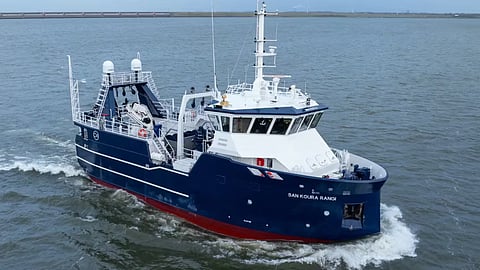VESSEL REVIEW | San Koura Rangi – Southern Ocean scampi trawler delivered to New Zealand fishing company
New Zealand seafood company Sanford recently took delivery of a new scampi trawler for operation in the Southern Ocean.
Named San Koura Rangi, the trawler has a steel hull, a length of 32.4 metres (106 feet), a beam of 10 metres (32 feet), a diesel-electric propulsion system to conserve fuel and reduce emissions, and a power management system to optimise engine performance.
The vessel was designed to satisfy Sanford’s operational requirements while having a hull that was as compact as possible.
Propulsion arrangement with ample backups
The propulsion arrangement consists of three Scania DI16 091M generators that each produce 450 kW, a Nidec LC400 700kW motor connected to a 2,200mm propeller, a Reintjes LAF 675 gearbox, a RubberDesign shaftline, a DMC Barke rudder, and a Veth Propulsion 100kW bow thruster.
The vessel also boasts a take-me-home function courtesy of a 100kW motor and a Caterpillar C4.4 emergency generator.
Full suite of electric deck machinery
The air-conditioned interiors have been carefully designed to be welcoming and comfortable for the crew. The large bridge windows meanwhile provide the crew with outstanding all-around visibility and abundant natural light, enhancing both safety and comfort in the wheelhouse.
Paint and a specialised anti-fouling coating are used on the exterior surfaces. The anti-fouling coating helps minimise the release into the atmosphere.
The trawler is also fitted with a Naust Marine compact full electric winch system that can regenerate power when paying out the trawl winches, which then optimises power consumption. Naust Marine also supplied the 11kW windlass.
An electric motor is fitted to enable automatic spooling of wires at different diameters while three 45kW net rollers are for use with the fishing gear and can be controlled either manually or remotely from the wheelhouse.
Processing facilities laid out to promote safety
The processing area has been functionally optimised to streamline onboard procedures while maintaining strict hygiene standards with an advanced freezer system for optimal catch preservation. Marefsol supplied a plate freezer, which uses CO2 for refrigeration, while VCU provided the fish processing setup.
The onboard processing layout has been developed to meet New Zealand’s strict hygiene requirements, ensuring optimal food safety and responsible working conditions for the crew.
In the wheelhouse are Alphatron electronics as well as CCTV camera screens, monitoring systems and plotters from ATL.
Other key features include a waste management system and bird protection systems that are deployed via dedicated winches.


